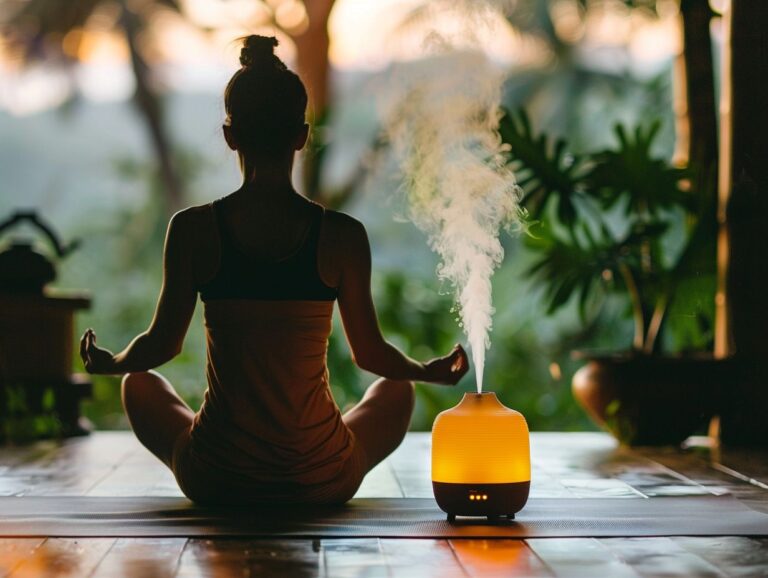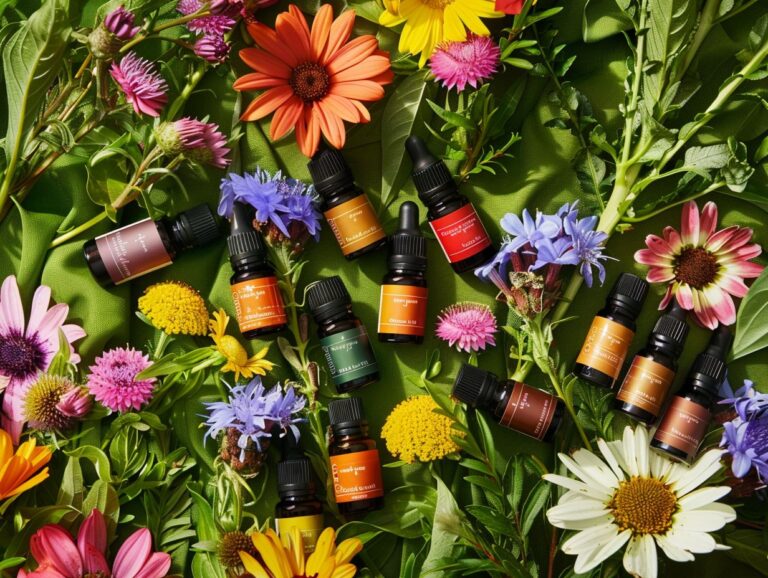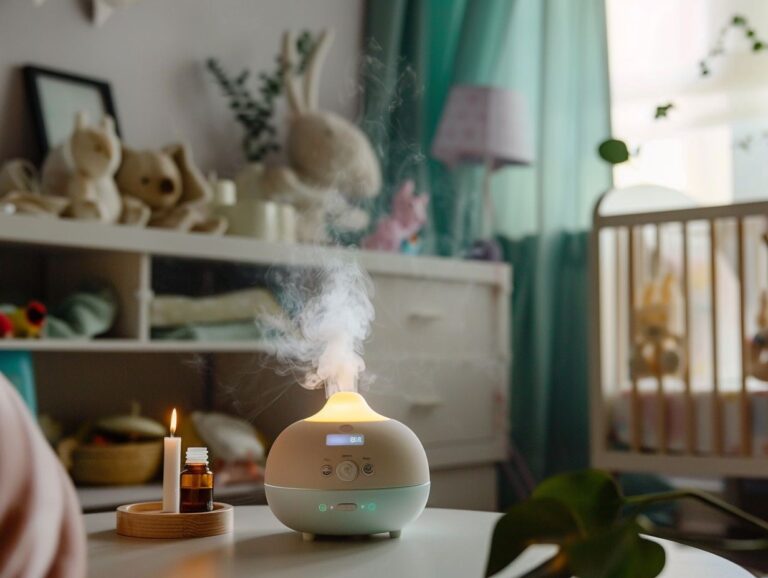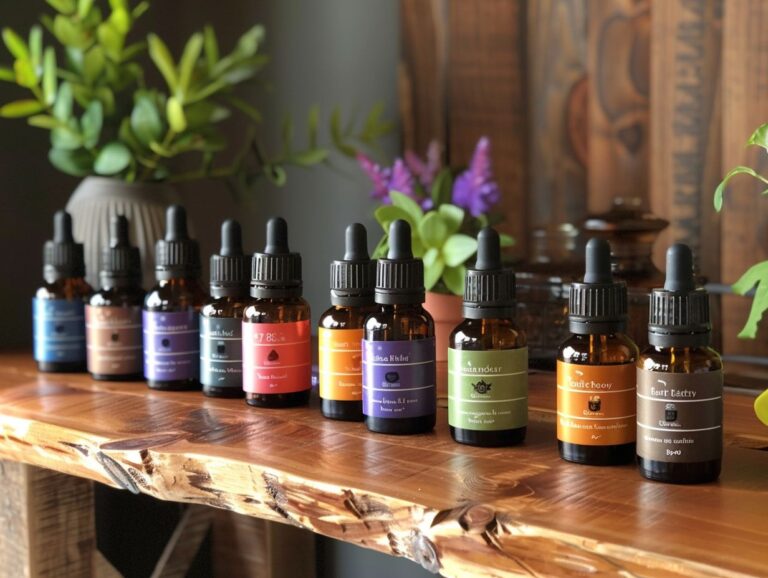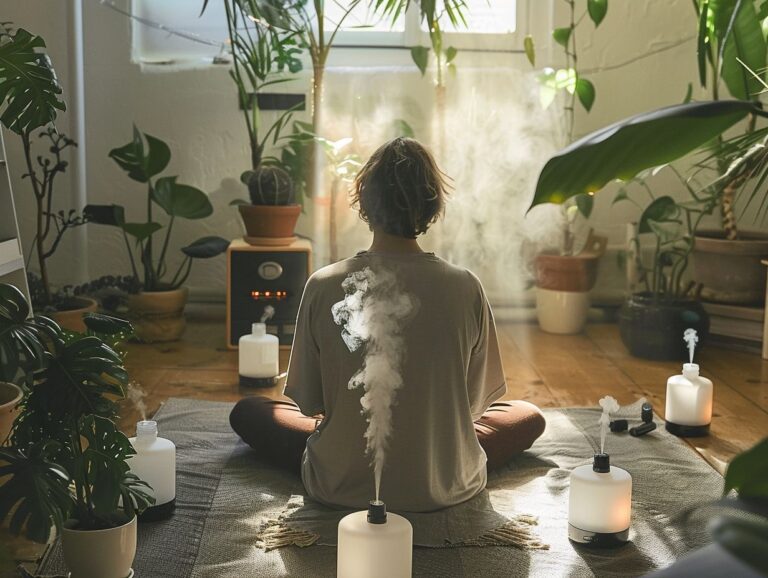What Does Lemon Aromatherapy Do
Curious about the benefits of lemon aromatherapy? Wondering how it can improve your mood, digestion, and even help with anxiety and headaches?
We will explore what lemon aromatherapy is, how it is used, and the various benefits it offers. We will also discuss any potential risks or side effects, as well as how to use lemon aromatherapy safely.
If you want to learn more about this refreshing and invigorating practice, keep reading!
Key Takeaways:
What is Aromatherapy?
Aromatherapy is a holistic healing treatment that uses natural plant extracts to promote health and well-being. It harnesses the therapeutic properties of essential oils through inhalation or skin absorption, offering various benefits for the mind and body.
Historically, the practice of aromatherapy dates back thousands of years, with ancient civilizations such as the Egyptians, Greeks, and Romans utilizing aromatic plant extracts for medicinal and spiritual purposes. The principles of aromatherapy are based on the idea that specific scents can trigger physiological responses in the body, influencing mood, relaxation, and overall well-being.
Essential oils are highly concentrated extracts derived from plants, flowers, roots, and seeds. These oils are produced through processes like steam distillation or cold pressing, preserving the volatile compounds that give them their therapeutic properties.
What is Lemon Aromatherapy?
Lemon aromatherapy involves the use of lemon essential oil, extracted from citrus lemon fruits, to achieve therapeutic benefits through its refreshing and invigorating aroma. The citrusy scent of lemon oil is a popular choice in aromatherapy for its uplifting and energizing properties.
Extracting lemon oil is a meticulous process that starts with cold-pressing the outer peel of the lemon to obtain the aromatic essence contained within its zest. This method ensures that the volatile compounds responsible for the distinct citrus fragrance are preserved. The resulting lemon essential oil possesses antibacterial and antifungal properties, making it a versatile remedy for skin conditions and respiratory ailments.
How is Lemon Aromatherapy Used?
Lemon aromatherapy can be used in various ways, such as diluting the oil for skin application, diffusing it in a room using a diffuser, or even ingesting it in controlled doses for specific benefits.
When using lemon essential oil topically, it is crucial to dilute it with a carrier oil like coconut or almond oil to prevent skin irritation. The diluted mixture can be applied to the skin, offering a refreshing and invigorating scent.
Inhalation through diffusion, whether with an electronic diffuser or simply adding a few drops to a bowl of hot water, can effectively spread the aroma throughout a space, promoting a sense of clarity and wellbeing.
What Are the Benefits of Lemon Aromatherapy?
Lemon aromatherapy offers a multitude of benefits ranging from improving skin health to enhancing cognitive performance. The refreshing scent of lemon oil can promote mental alertness and improve focus during cognitive tasks.
Lemon aromatherapy is known for its skin-enhancing properties, as it can help reduce acne and blemishes, leaving the skin looking fresh and rejuvenated. The antibacterial and astringent properties of lemon oil make it a popular choice for those dealing with oily or acne-prone skin.
Moreover, the invigorating aroma of lemon can also uplift moods and reduce stress levels, making it a great option for relaxation and combating anxiety. Its citrusy fragrance is often used in aromatherapy practices to create a cheerful and energizing atmosphere.
Does Lemon Aromatherapy Help with Anxiety?

When the scent of lemon reaches the olfactory system, it triggers a response in the brain that can help create a sense of calmness and reduce feelings of anxiousness. This natural method taps into the power of aromatherapy, a holistic approach that has been used for centuries to enhance overall well-being.
Plus its mental health benefits, lemon aromatherapy also has physical effects, such as boosting mood and energy levels, which can further contribute to a sense of balance and tranquility.
Can Lemon Aromatherapy Improve Mood?
Lemon aromatherapy is known to improve mood and uplift spirits through its fresh and citrusy scent. The aroma of lemon oil can have a positive impact on emotional well-being and promote a sense of happiness.
The bright and invigorating fragrance of lemon can help combat feelings of sadness and boost one’s mood, making it a popular choice for those seeking natural ways to enhance their emotional state. Whether diffused in the air, added to bathwater, or used in massage oils, the scent of lemon can create a refreshing and energizing atmosphere.
Lemon essential oil is also believed to have properties that can reduce stress and anxiety, further contributing to its mood-enhancing effects. This natural remedy is a favorite among aromatherapy enthusiasts looking to create a cheerful and uplifting environment in their homes or workplaces.
Does Lemon Aromatherapy Have Antioxidant Properties?
Lemon aromatherapy exhibits antioxidant properties that can help protect cells from damage caused by free radicals. The antioxidants in lemon oil contribute to overall health and well-being.
The powerful antioxidants present in lemon aromatherapy play a crucial role in neutralizing harmful free radicals, which are known to lead to various health issues by causing oxidative stress within the body. By combating oxidative stress, lemon oil helps in promoting cellular health and supporting the body’s natural defense system.
The refreshing citrus scent of lemon essential oil also makes it a popular choice in household cleaning products. Its natural antibacterial properties not only cleanse surfaces effectively but also leave a pleasant aroma behind, making it an ideal ingredient for eco-friendly and safe cleaning solutions.
Can Lemon Aromatherapy Help with Digestion?
Lemon aromatherapy is thought to aid digestion by stimulating the production of digestive juices. Inhaling the aroma of lemon oil or ingesting it in controlled doses may offer digestive benefits.
When the scent of lemon wafts through the air, it can trigger the brain to increase the production of enzymes and acids crucial for digestion, helping the body break down food more efficiently. This can be particularly beneficial for individuals struggling with indigestion, bloating, or sluggish digestion.
The gentle and natural properties of lemon make it a popular choice for easing digestive discomfort without harsh side effects often associated with synthetic medications. Its use in aromatherapy promotes a sense of relaxation and calm, which can further support healthy digestion by reducing stress-related digestive issues.
Does Lemon Aromatherapy Have Antibacterial Properties?
Lemon aromatherapy possesses antibacterial properties that can help in cleaning and disinfecting. The antimicrobial effects of lemon oil make it a natural choice for household cleaning purposes.
When utilized in cleaning applications, lemon aromatherapy can not only remove dirt and grime but also eradicate harmful bacteria lurking on surfaces.
The refreshing citrus scent of lemon oil adds a pleasant aroma to the cleaned area while its antibacterial qualities work behind the scenes.
Many eco-conscious households are opting for lemon oil as a safer alternative to harsh chemical cleaners, knowing that it can effectively disinfect without the use of synthetic additives.
Can Lemon Aromatherapy Help with Headaches?

One of the main reasons why lemon oil is effective for managing headaches is its soothing properties. The citrusy scent of lemon is known to have a refreshing and invigorating effect on the mind, which can help reduce the intensity of headaches.
There are various methods of applying lemon aromatherapy for headache relief. You can add a few drops of lemon oil to a diffuser and inhale the fragrance slowly. Alternatively, you can dilute lemon oil with a carrier oil and gently massage it onto your temples and neck area for a calming effect.
Incorporating lemon essential oil in your bath can also provide a relaxing experience, helping to ease tension and promote a sense of well-being.
Are There Any Risks or Side Effects of Lemon Aromatherapy?
While lemon aromatherapy is generally safe, there are some risks and side effects to consider, especially for pregnant women and individuals with photosensitivity. Caution should be exercised when using lemon oil in such cases.
During pregnancy, it is crucial to be mindful of the essential oils used, as they can potentially cross the placenta and affect the developing fetus. Lemon oil, when not used in moderation, may cause contractions due to its stimulating properties. For individuals with photosensitivity, direct application of lemon oil on the skin can lead to adverse reactions such as redness, irritation, or even burns upon exposure to sunlight.
It is advisable to conduct a patch test before widespread application to rule out any allergic reactions. Consultation with a healthcare provider or aromatherapist is recommended, especially for pregnant individuals, to ensure safe and appropriate use of lemon essential oil.
Who Should Not Use Lemon Aromatherapy?
Certain groups, such as pregnant women, children, and individuals with specific health conditions, should avoid using lemon aromatherapy due to potential risks and adverse effects. Consulting a healthcare provider is advisable before using lemon oil in such cases.
Expectant mothers are particularly cautioned against utilizing lemon essential oil as it may trigger adverse reactions during pregnancy.
Children, especially infants and young kids, have delicate systems that could be sensitive to strong scents like lemon, potentially causing respiratory issues or skin irritation.
Individuals with certain health conditions, like skin sensitivities, allergies, or respiratory disorders, could experience exacerbated symptoms when exposed to lemon-scented products. It’s crucial for these groups to steer clear of lemon aromatherapy to prevent any health complications.
Seeking guidance from a medical professional is paramount for those who fall into these categories, as they can offer personalized advice based on the individual’s health status and potential risks associated with lemon oil usage.
Can Lemon Aromatherapy Interact with Medications?
Lemon aromatherapy may interact with certain medications, altering their effects or potency. It is essential to consult a healthcare provider or pharmacist before using lemon oil if you are on medication to avoid potential interactions.
When lemon oil is inhaled or applied topically, it can have implications for drugs metabolized by the liver, particularly those using the cytochrome P450 enzyme system. Common medications like statins, blood thinners, and certain anti-depressants may be affected by lemon oil, leading to adverse effects or reduced efficacy.
These interactions can result in an increased risk of side effects or a decrease in the medication’s effectiveness, posing a potential threat to your health and well-being. Therefore, always disclose your use of essential oils like lemon oil to your healthcare provider for a comprehensive evaluation of any possible drug interactions.
How to Use Lemon Aromatherapy Safely?
To use lemon aromatherapy safely, it is crucial to follow proper guidelines regarding dosage, application methods, and choosing reputable manufacturers for high-quality essential oils. Safety precautions should be observed to maximize the benefits of lemon oil.
When using lemon essential oil for aromatherapy, it is recommended to start with a low dosage to test sensitivity. Typically, 3-5 drops diluted in water or a carrier oil is a good starting point.
- For topical application, mix lemon oil with a carrier oil like almond or coconut oil to avoid skin irritation. Diluting the oil helps prevent adverse reactions.
- Always opt for oils from trusted manufacturers to ensure purity and quality. Look for organic, therapeutic-grade oils for the best results.
It’s advisable to perform a patch test before widespread use to check for any allergic reactions or skin sensitivities. By following these recommendations, you can enjoy the refreshing benefits of lemon aromatherapy with confidence.
What are the Different Methods of Using Lemon Aromatherapy?

When diffusing lemon essential oil, the fresh and invigorating scent can uplift your mood and create a refreshing atmosphere in any room. For skin care, mixing a few drops of lemon oil with a carrier oil like jojoba or coconut can help brighten the skin, reduce acne scars, and even out skin tone.
In the culinary world, lemon aromatherapy can be a game-changer for enhancing dishes. Whether it’s adding a drop to your salad dressing for a zesty kick or incorporating it into baked goods like lemon-infused cakes or cookies, the possibilities are endless.
Frequently Asked Questions
What Does Lemon Aromatherapy Do?
Lemon aromatherapy is a form of alternative medicine that uses the scent of lemons to promote physical and emotional wellness. It involves inhaling the essential oils or using them topically to experience the benefits of lemon.
How Does Lemon Aromatherapy Work?
Lemon essential oil contains compounds that can affect the body and mind when inhaled or applied to the skin. These compounds interact with the brain and nervous system, promoting various therapeutic effects such as improved mood, relaxation, and pain relief.
What Are the Benefits of Lemon Aromatherapy?
Lemon aromatherapy has been found to have numerous benefits, including boosting energy and alertness, improving digestion, reducing stress and anxiety, and enhancing immune function. It may also have antibacterial and antiviral properties.
Is Lemon Aromatherapy Safe?
When used properly, lemon aromatherapy is generally considered safe for most people. However, some individuals may have allergic reactions or skin irritation when using lemon essential oil. It is always recommended to do a patch test before using it topically and to consult with a healthcare professional if you have any concerns.
How Do I Use Lemon Aromatherapy?
There are several ways to use lemon aromatherapy, including inhaling the scent directly from the bottle, using a diffuser, or adding a few drops to a bath or massage oil. You can also dilute the essential oil with a carrier oil and use it topically on the skin.
Can Lemon Aromatherapy Help with Illnesses?
While lemon aromatherapy can have numerous benefits, it should not be used as a replacement for medical treatment. It may help alleviate symptoms of certain illnesses, but it is not a cure. Always consult with a healthcare professional for proper diagnosis and treatment.


